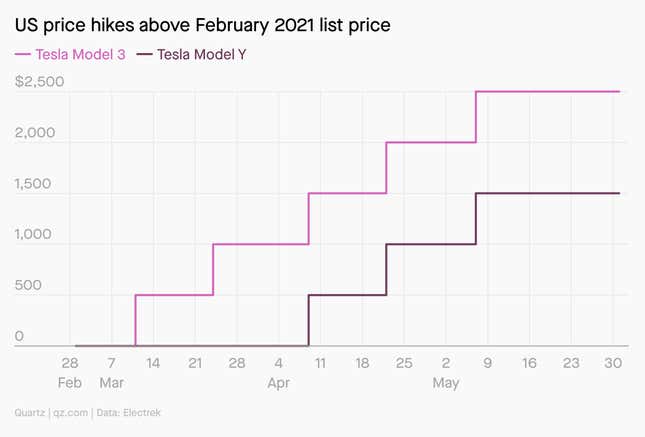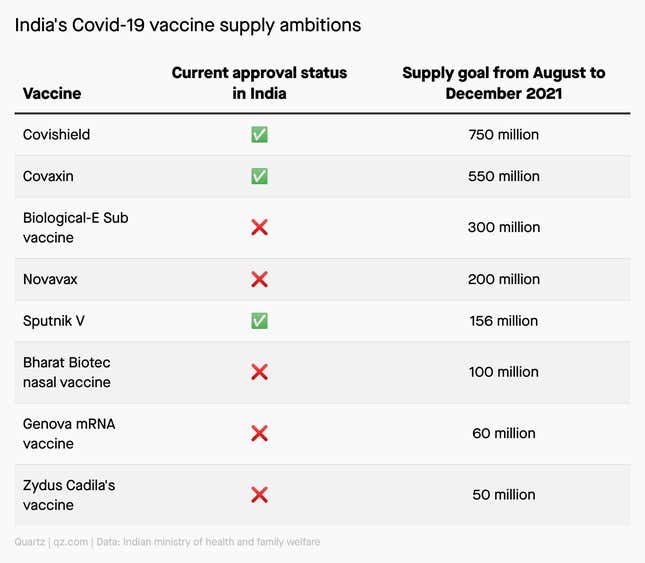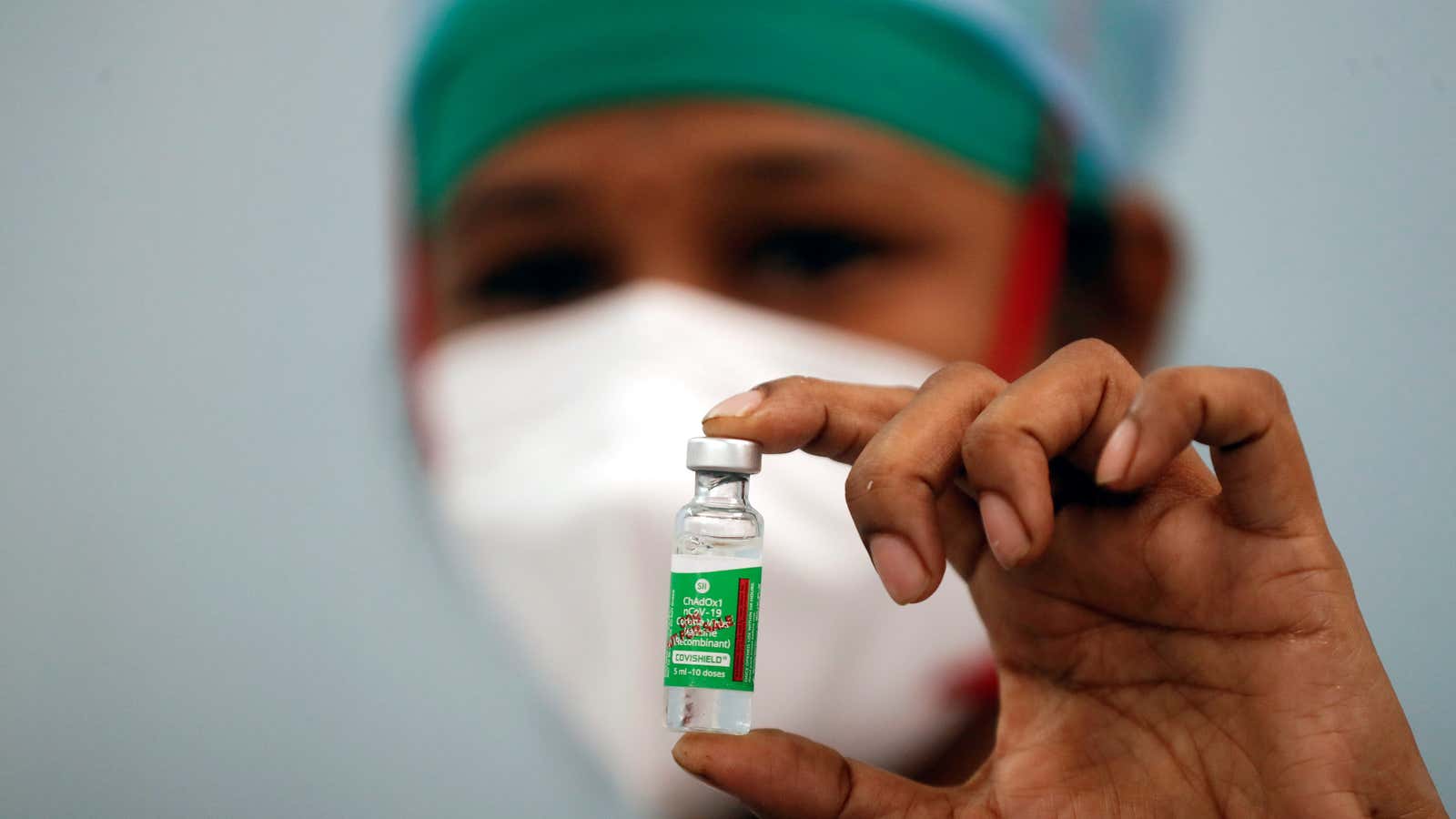Good morning, Quartz readers!
Was this newsletter forwarded to you? Sign up here. Want a reason to forward it? Send this email to the person in your life who always respects boundaries.
Here’s what you need to know
Japan hosts a Covax summit… It will increase its contribution to the World Health Organization’s global vaccine initiative to $1 billion. Meanwhile its Olympians began getting their first doses.
…and India plans to administer 10 million vaccine doses a day. That would be more than triple the present daily rate, even as the country continues to struggle with shortages. Read more below.
The EU drafts new tax transparency rules for multinationals. To ensure giant companies pay their fair share of taxes, Europe wants more information on how much tax they pay in different member states, and how many people they employ.
Israel’s opposition is running out of time. Ultra-nationalist millionaire Naftali Bennett and centrist Yair Lapid must today cement their deal to form a coalition government without prime minister Benjamin Netanyahu, or the country faces a fifth election.
The SEC thinks Tesla isn’t properly moderating Elon Musk’s tweets. Since 2019, the US Securities and Exchange Commission has twice told the company it failed to pre-approve its CEO’s market-moving utterances as agreed in a court-ordered deal.
Malaysia will summon China’s envoy after a military intrusion in its airspace. Sixteen Chinese fighter jets on Monday flew close to South China Sea fishing grounds that fall in Kuala Lumpur’s exclusive maritime economic zone, but which Beijing also lays claim to.
What to watch for
HarmonyOS, or Hong Meng in Chinese, is Chinese telecom equipment giant Huawei’s bid to reduce its reliance on Google’s Android, whose parts and apps it’s had trouble accessing since the US slapped sanctions on Huawei in 2019.
The release of Harmony 2.0 today, the first Harmony to be available on Huawei’s mobile phones, will give users a sense of whether the operating system is simply an Android knock-off, or a platform that can help Huawei shift its focus from hardware to software.
Here’s a brief history of how Huawei became the US’s major tech enemy:
2005: A report commissioned by the US Air Force raises the idea that the company’s founder has ties to the Chinese military, an allegation Huawei has repeatedly denied (pdf).
2012: A US House of Representatives committee warns against using equipment from Huawei and another Chinese telecom giant, ZTE (pdf).
2018: Meng Wanzhou, Huawei’s CFO and the daughter of its founder, is arrested in Canada at the request of the US on suspicion of violating trade sanctions on Iran.
2019: The US files a slew of criminal charges against Huawei, including conspiring to evade US trade sanctions. Later that year, the company is put on a US trade blacklist.
May 2021: In a Nikkei opinion piece, Huawei’s senior vice president Vincent Peng urges the Biden administration to talk it out.
Charting Tesla’s price hikes
The global chip shortage—what doesn’t it affect? The pandemic-driven supply chain scarcity is thwarting toaster-makers and smartphone manufacturers alike. Automakers are particularly hard-hit, and the more computerized a car is, the more reliant it is on chips.
Tesla has staked most of its reputation on being the car of the future. The future, however, requires semiconductors. CEO Elon Musk says the chip shortage is at the root of several recent price hikes caused by production challenges. But, skeptics point out, it could just be the company cashing in on recent demand for electric vehicles.

India’s big vaccine promises don’t add up
The Indian government claims it will vaccinate over 1 billion Indians by December. The going, thus far, has been slow. In a press conference on May 13, a government representative announced that the country would be manufacturing 2.16 billion vaccines “in India and for Indians” between August and December.
That sounds promising, except that millions of the jabs included in that number have yet to even finish trials.

The government also based its math on manufacturing facilities operating at capacities they haven’t even reached yet. Manavi Kapur takes a hard look at the numbers.
✦ Our Quartz India team will walk you through how the Covid-19 crisis in one of the most populous countries in the world is affecting the rest of the planet. To support our journalism, try out a membership, free.
Handpicked Quartz
🤔 For young companies, is it better to stay focused or diversify?
🏦 How Africa could become a world leader in central bank digital currencies
🇮🇳 Has India’s central bank changed its mind about cryptocurrencies?
🎤 “Never give up:” A Hong Kong boy band has emerged as the voice of a city under crackdown
💉 A negative antibody test does not mean the Covid-19 vaccine did not work
(Psst.☝️ We took the last story out from behind our paywall. We feel that strongly about it.)
Surprising discoveries
A new weather service debuts on Twitter. The paid service will cost $10 a month.
Florida’s Orlando Melbourne International Airport is changing its name. It’ll now be Melbourne Orlando International Airport after a lawsuit claimed the old one was confusing passengers trying to get to Disney World. That should clear things up.
A Filipino town will give away a cow a month to vaccine recipients. The mayor hopes the raffle will moo-tivate citizens to get the jab.
Yemeni fishermen retrieved $1.5 million worth of ambergris from a whale carcass. The sticky, smelly substance is used in perfumes.
An image of an alleged alien autopsy is being sold as an NFT. Bidding for the single frame from a 1947 film starts at $1 million.
Our best wishes for a productive day. Please send any news, comments, Twitter weather forecasts, and cow raffles to hi@qz.com. Get the most out of Quartz by downloading our iOS app and becoming a member. Today’s Daily Brief was brought to you by Tripti Lahiri, Sumnima Lama, Mary Hui, Jane Li, Liz Webber, and Susan Howson.
